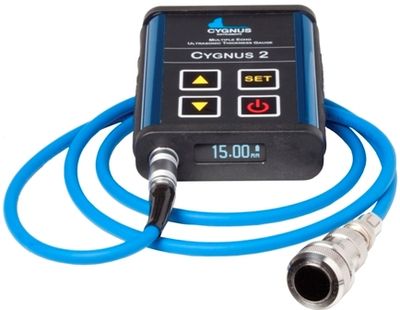Ultrasonic thickness gauges are absolutely vital to many industries today. From inspecting massive oil tankers for corrosion damage to identifying leaks in diesel injected engines, many different jobs require the use of an ultrasonic thickness gauge every single day. There isn’t just one standard type of ultrasonic thickness gauge though, you can find a wide variety of these devices for use for a number of different applications. Below are a few different types of ultrasonic thickness gauges, and a brief description of their use.
Surface Thickness Gauges
Surface thickness measurement gauges are the most universally used type of ultrasonic thickness gauge because they have such a wide variety of uses and applications.
Surface thickness measurement gauges come in a selection of models, each specific to a certain application. There are general-purpose surface thickness measurement gauges that are usually used to easily identify metal thickness and corrosion on structures. Higher quality devices are able to measure through coatings and paint, giving an uninterrupted reading of the thickness. They are typically handheld, light, and easy to carry around to different job sites.
 There are also hands-free surface thickness measurement gauges that are convenient when measuring more difficult to reach structures. These are commonly used when the user must be lowered down to the structure that needs to be measured via rope-access. This is common when being lowered from bridges to measure the thickness of a pillar supporting a bridge, for example.
There are also hands-free surface thickness measurement gauges that are convenient when measuring more difficult to reach structures. These are commonly used when the user must be lowered down to the structure that needs to be measured via rope-access. This is common when being lowered from bridges to measure the thickness of a pillar supporting a bridge, for example.
Subsea Thickness Gauges
The subsea thickness gauge works just like the surface thickness gauge in that it measures the thickness of a structure, except that it does so underwater. Quite frequently underwater oil and gas pipelines must be measured to identify any corrosion and gauge any potential problems, which is where this type of device becomes essential. Subsea thickness gauges differ from surface thickness gauges in that they must be built to withstand heavy pressure and constant underwater exposure.
Constantly having to hold on to a subsea thickness gauge can be difficult for a diver, which is why some are designed with ease in mind. Some models come with a heavy-duty wrist strap to ensure the diver has the use of both hand in restricted space situations, whilst also making it easier for the diver to clearly see the readings the device returns.
Industrial Leak Detectors
Another very common and important product that uses ultrasonic technology is an industrial leak detector. These detectors are able to identify different kinds of leaks in different kinds of industrial machinery. Industrial leak detectors are commonly used to verify steam-pipe seals, check the integrity of different seals, and search for faults in electrical insulation. They are also commonly used to in different motor or rail vehicles to determine if cabins and doors are completely sealed, and to even check the fuel injection in diesel engines.
These industrial leak detectors are typically very easy to use and identify readings, and higher quality detectors are very, very sensitive. Identifying leaks early in different situations can be crucial to ensuring there aren’t any bigger problems down the road.

